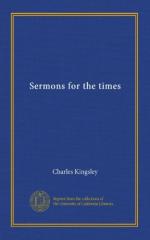I cannot tell you altogether, my friends; for eye hath not seen, nor ear heard, nor hath it entered into the heart of man to conceive what God has prepared for those who love Him. But this I can tell you, that these things are taken from men, instead of being added to them, by their not seeking first God’s kingdom and His righteousness. I can tell you, as the Prophet does, that it is the sins of man which withhold good things from him; because though, as the Prophet says in the same place, God sends the good things, and the former and latter rain in their season, and reserves to men still the appointed weeks of harvest, yet men will not fear that same Lord their God; and therefore those good things are wasted, and mankind remains too often miserable in spite of God’s goodness, and starving in the midst of God’s plenty.
If you wish to know what I mean, look but once at this present war. I do not complain of the war. I honour the war. I thank God from the bottom of my heart for this great and glorious victory, and I call on you to thank Him, too, for it. I am none of those who think war sinful. I cannot do so, for I swore at my baptism to fight manfully under Christ’s banner against the world, the flesh, and the Devil; and if we cannot reach the Devil and his works by any other means, we must reach them as we are doing now, by sharp shot and cold steel, and we must hold it an honourable thing, and few things more honourable on earth, for a man to die fighting against evil men, and an evil world-devouring empire, like that of Babylon of old, or this of Russia now, that he may save not merely us who sit here now, but our children’s children, and generations yet unborn, from Russian tyranny, and Russian falsehood, and Russian profligacy, and Russian superstition. I say, I do not complain of this war; but I ask you to look at the mere waste which it brings, the mere waste of God’s blessings. Consider all the skilful men now employed in making cannon, shot, and powder to kill mortal men, who might every one of them, in time of peace, have been employed in making things which would feed, and clothe, and comfort mortal man. Consider that very powder and shot itself, the fruit of so much labour and money, made simply to be shot away, once for all, as if a man should spend months in making some precious vessel, and then dash it to pieces the moment it was made. Consider that Sevastopol alone; the millions of money which it must have cost—the stone, the timber, the iron, all used there—in making a mere robber’s den, which might all have been spent in giving employment and sustenance to whole provinces of poor starving Russians. Consider those tens of thousands of men, labouring day and night for months at those deadly earthworks, whose strong arms might have been all tilling God’s earth, and growing food for the use of man. And then see the waste, the want, the misery which that one place, Sevastopol, has caused upon God’s earth.




